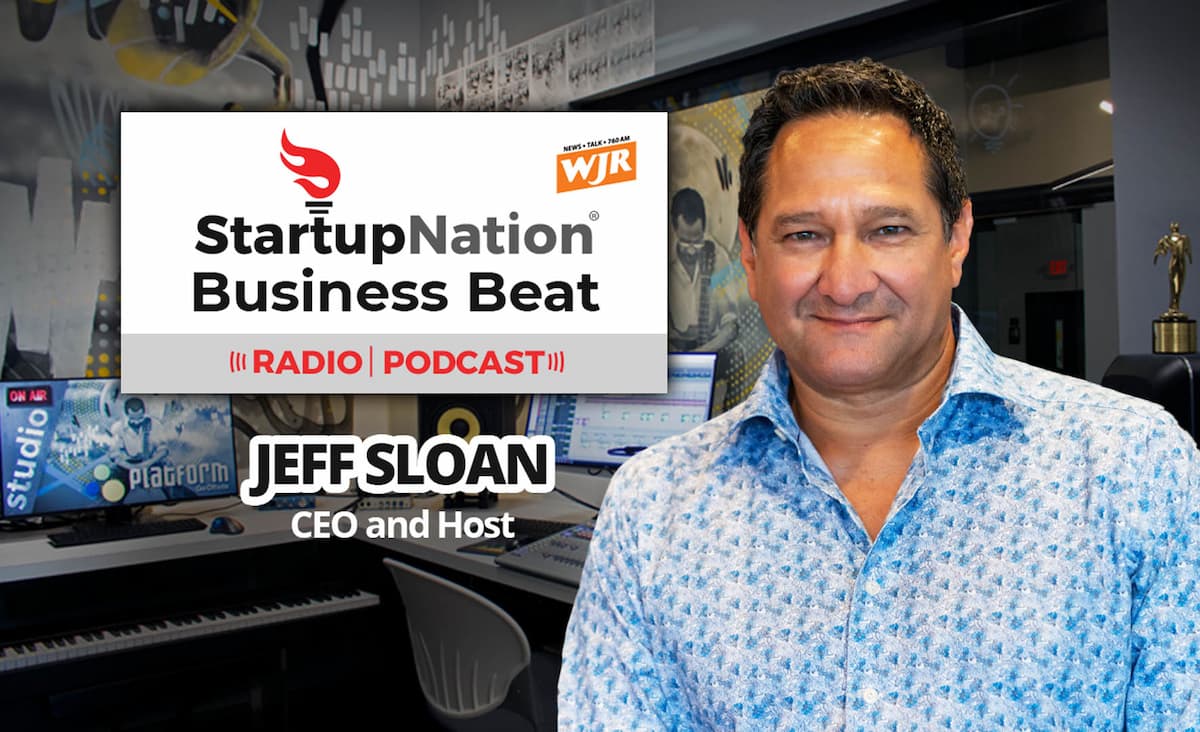On this morning’s edition of the WJR Business Beat, Jeff chats with Guy Gordon about the average age of successful entrepreneurs. The two discuss findings of a recent Harvard Business Review study, which may surprise you!
Tune in to the Business Beat, below, to learn more about entrepreneurial success by age demographics:
Tune in to News/Talk 760 AM WJR weekday mornings at 7:11 a.m. for the WJR Business Beat. Listeners outside of the Detroit area can listen live HERE.
Are you an entrepreneur with a great story to share? If so, contact us at [email protected] and we’ll feature you on an upcoming segment of the WJR Business Beat!
News Talk 760 WJR.
Here is special guest host, Guy Gordon.
I don’t know if you harbored this dream, but I know a lot of people do, that you could become the next Bill Gates or the Steve Jobs. You’d come up with that idea, or the Zuckerberg, you come up with that idea that is the next big thing. And it turns you into, if not a billionaire, it gives you comfort in the future financial life that you want.
The problem is, is that if you look at Jobs, Zuckerberg and Gates, they all did their big idea when they were in their twenties. And it leaves the impression that to be a successful entrepreneur, that you need to be young. And that is not necessarily the case.
We turned to Jeff Sloan from WJR’s Business Beat and the founder and CEO of StartupNation.
I mean, this is in his wheelhouse. And Jeff, this is such an interesting study that was published in the Harvard Business Review because it, it, it’s kind of a MythBuster.
Good morning, Guy.
Yes, indeed. Well, listen, don’t give up on your entrepreneurial dreams. Actually, other studies have found that entrepreneurs in their forties, fifties and sixties are the most successful.
The average age of a startup entrepreneur meeting with the most success is actually around 45. And that’s, and I mean, and that’s even true if you factor in the technology sector, which is perceived to be a young person’s business.
Yeah, indeed. I think, you know, I’ll give the edge to the younger set, the younger demographic when it comes to coming up with that big idea, that revolutionary idea, especially in the tech sector, you know, software sector, social media companies, et cetera, those, those young people grow up with a platform, understanding a basic fundamental understanding of technology that allows them to leap frog the older set, us older guys, if you will, are seasoned or more with guys with more wisdom, if you will, but also guys that are, you know, used to a different way of conducting their lives.
And these young people grew up on the next big thing, and then they’re able to take that to the next step. So, I give the nod to them there.
I found it really interesting Jeff, because I think when you get in your forties, you’ve got a mortgage. You’ve got kids, you’ve got a house. You have more at risk if you fail. At least that’s the perception, and yet, you’re right, in the 45 to 55 age bracket is where we find the highest degree of success.
Yeah, I think it really depends, Guy, on what type of business we’re talking about. Again, give the edge to the younger guys for these big, big ideas in software and so on. But I think the average business, when you look at Main Street businesses, even biotech, for example, other technology businesses, seasoned entrepreneurs tend to do better because they build a base of knowledge over time that’s critical for some of these businesses, but they also build leadership skills. You know, they know how to manage their time. They build leadership skills. They’re more practical about their business. And in fact, a recent study by the Census Bureau and two MIT professors found that companies employing people, you judge success by how many employees they have, again, forties, fifties, even sixties do much better than the younger set. So, I think it really depends on what type of business sector we’re talking about here.
And we should point out too, that entrepreneurship isn’t necessarily just the big idea. It can be starting a restaurant or starting that maybe turns into a franchise thing, kind of the Mike Ilitch model. Um, it it’s, it’s not, it, it may start out as a small business that you can, uh, replicate several times. It’s not necessarily the game changer.
Guy that is it. You nailed it. I love the Mike Ilitch example, that’s exactly right. We tend to get polluted because the media sensationalizes, and obviously for good reason, it’s amazing when someone in their twenties creates a multi-billion dollar company, it’s a sensation. And so, you know, we tend to look at those very rare, marginal examples as what entrepreneurship is all about.
But the fact of the matter is, you said it. Making pizza, you know, providing mortgages, growing a, an automobile business or a supplier business to the automotive industry. These are things we know well, these kinds of nuts and bolts, blue collar entrepreneurship here in the Midwest. These are the mainstay.
This is the mainstay of America’s economy. And so the sensational ideas get a lot of press. But you’re absolutely right, Guy, entrepreneurship is about a lot more than that.
So, does that media bias extend to the venture capital community? The people that hold the purse strings that can make the difference between an idea foundering and dying from lack of oxygen. Do they have the same age bias? Do they have the same perception problem, and think that only the young folks have the chops to, to bring a big idea home?
Yeah. It’s not necessarily that they think the young people can execute better. The average age, actually, of a VC-backed company, I believe is around 32.
So, it does skew younger, no question about it, but here’s why. This is a unique part of the business sector. Again, it actually a very small part of what makes up of all of the startup community. The reason VCs back these young people is what we talked about earlier. They tend to have these big ideas. They’re, you know, they’re growing up with a different mindset about how they’re going to be living their lives and they tend to be the early adopters of these big technology ideas and so VCs tend to back younger entrepreneurs because they have these bigger ideas and VCs are, these are investors who have institutional money invested in their fund. They have to invest it in these companies wisely and they have to generate a return, so they’re looking for a quick turn. And these young companies with these big ideas tend to be the fast growth companies. And that’s why they hit the, you know, that’s why they become the media sensation. They make the big news, but they’re a very small part of what makes up the entire entrepreneurial community.
It is really a fascinating study. And I guess it’s, you know, as a guy that’s got a few years on him, it’s encouraging because one of the graphs they have in here, Jeff says the probability of extreme startup success rises with age and it rises until the late fifties. It’s not until about the age 62 or 63 that we see the chances of success decline. So, I mean, it’s, even if we talk about the, you know, the, kind of the classic case where the person is 45 or a little bit older, this can extend well into your late fifties too. So, I guess the takeaway here is don’t be discouraged and don’t think that this can’t be you.
Absolutely, Guy, you’ve nailed it. A 50-year-old startup founder is actually 2.8 times more likely to found a successful startup then is the 25 year old founders.
So, there is hope for us, Guy. Keep those ideas coming and, uh, if you’ve got a good one, go after it and then call Jeff Sloan at StartupNation and he’ll help you bring it home.
Thanks so much, always a pleasure to talk with us and, uh, remember that you can find WJR’s Business Beat always in the mornings on the Paul W. Smith Show with Jeff Sloan, uh, take care. And you can read about this in the Harvard Business Review, as well.






